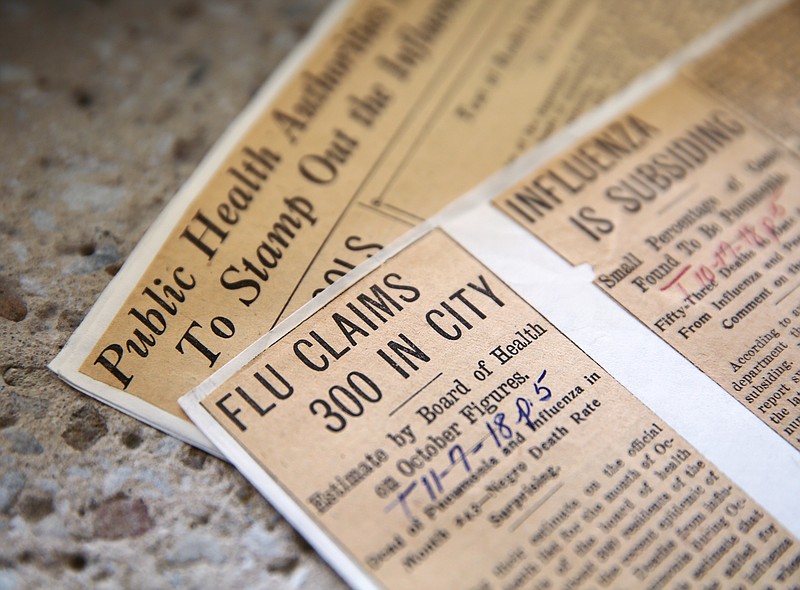If COVID-19 is a 100-year plague, then the last great American pandemic in 1918 should contain lessons for us today.
In December 1918, during the deadly "Spanish flu" pandemic that killed 675,000 Americans, families in the Chattanooga area faced some of the same "second wave" hardships we feel today.
By Christmastime 1918, cases here were down from a peak of thousands two months earlier, in October, when as many as 12 people died in one day. By December, cases here were in the hundreds, according to news reports. But hot spots flared.
Like today, there were also reasons for hope.
In 2020, hope rests in the promise of emerging vaccines. In late 1918, the deadly flu was tempered by joy over the end of World War I, or the Great War as it was known then.
The following news items, taken from archives of the Chattanooga Daily Times, represent the news of the day in the Tennessee Valley in December 1918, 102 years ago this month.
As they are today, the news columns in 1918 were filled with cautions against public spread of the virus, school closings, treatments and praise for medical workers.
Much has changed, but, as you will read, much has not.
___
Dec. 10, 1918
"An inquiry of 30 of the city's most prominent physicians conducted by city health director Ben H. Brown during the past few days has exposed the presence of from 200 to 300 cases of influenza in the city and suburbs. We are expecting to have a large number of new influenza cases throughout the winter; people may as well resign themselves to the situation. The November death report shows a total of 120 deaths in the city; of this number 42 were chargeable to influenza."
___
Dec. 18
"(People) have grown careless in the matter of coughing and sneezing openly, thus jeopardizing the health of others. They should cover the cough and the sneeze with a handkerchief to prevent the distribution of germs as a consequence of the explosion of foul air from the lungs, either through the nose or the mouth.
"The transmission of flu from person to person, thus creating an epidemic, is through pollution in the air by ejaculatory coughing and sneezing on the part of the victims."
___
Dec. 24
"Cleveland, Tenn. - Cleveland again is in the grip of an influenza epidemic that is said to be more general, although of a milder form, than the previous one.
"Schools, churches, picture shows, pool rooms and other places of public congregation have been closed for the past week by order of the board of health and will remain so until conditions improve."
___
Dec. 22
From the "Times 50 Needy Cases" report:
"There are six (children) in all and the oldest child is only 12, not yet old enough to contribute anything to the support of the others. Recently, the entire family fell victim to the flu, and indeed it looked as if things could not be worse for them, but Red Cross volunteers nursed them through the worse stages of their illness, realizing that otherwise some of the little ones would not survive. Now they are penniless and hungry, and the father is a soldier in France. They need food and money."
___
Letter to the editor of the Chattanooga Daily Times, Dec. 29:
"Just a word in behalf of Erlanger Hospital. I am 59 years old and until recently was never in a hospital, and, in fact, was more or less prejudiced against hospitals, doctors and medicine in general.
"Being stricken down with influenza about Dec. 12, upon advice of my physician, I was removed to Erlanger Dec. 17. I was a pay patient to be sure, but cannot speak in too high terms of the nurses who were ever ready, day and night, to minister to my needs. When I take the flu again, I want to go to Erlanger Hospital."
Mrs. M.V. Beene, Graysville, Tenn.
___
Dec. 29
"A curious feature in connection with the epidemic of influenza in South Africa, where a total of 50,000 deaths has been reported and where it has left no fewer than 2,000 orphans in Capetown alone, is the disease has spread to the baboons in the outlying districts and they are reported to be dying like fleas, according to The New York Times."
___
Dec. 31
"The First District Grammar School at Douglas Street and McCallie Avenue was closed yesterday on account of the flu. Do not get alarmed. There is no evidence of an epidemic. It's true the school was closed because of the flu, but there is no cause for panic. ... The flu is confined to one case, that person being the janitor."
___
Dec. 31
"Cleveland, Tenn. - The flu ban was raised today, and churches were open for services. Picture shows, schools and other places that had been closed will reopen Monday. The influenza situation has not improved, but in fact has reported to be worse, if changed at all, but the schools have lost so much time already that much more cannot be afforded if a successful year is to be had."
___
Dec. 31
Copy from a display advertisement for flu treatment: "La Grippe Flu Gasterone. The great help to prevent the flu. Acts like magic for indigestion, constipation, for female troubles it is unbeatable, sold by all druggists."
Email Mark Kennedy at mkennedy@timesfreepress.com.
View other columns by Mark Kennedy

